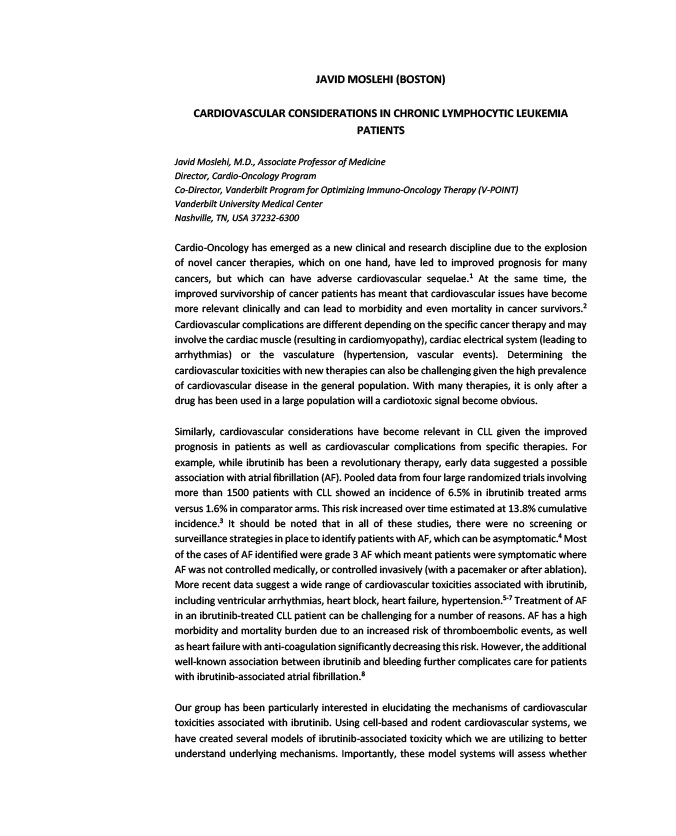
JAVID MOSLEHI (BOSTON)
CARDIOVASCULAR CONSIDERATIONS IN CHRONIC LYMPHOCYTIC LEUKEMIA
PATIENTS
Javid Moslehi, M.D., Associate Professor of Medicine
Director, Cardio-Oncology Program
Co-Director, Vanderbilt Program for Optimizing Immuno-Oncology Therapy (V-POINT)
Vanderbilt University Medical Center
Nashville, TN, USA 37232-6300
Cardio-Oncology has emerged as a new clinical and research discipline due to the explosion
of novel cancer therapies, which on one hand, have led to improved prognosis for many
cancers, but which can have adverse cardiovascular sequelae.1 At the same time, the
improved survivorship of cancer patients has meant that cardiovascular issues have become
more relevant clinically and can lead to morbidity and even mortality in cancer survivors.2
Cardiovascular complications are different depending on the specific cancer therapy and may
involve the cardiac muscle (resulting in cardiomyopathy), cardiac electrical system (leading to
arrhythmias) or the vasculature (hypertension, vascular events). Determining the
cardiovascular toxicities with new therapies can also be challenging given the high prevalence
of cardiovascular disease in the general population. With many therapies, it is only after a
drug has been used in a large population will a cardiotoxic signal become obvious.
Similarly, cardiovascular considerations have become relevant in CLL given the improved
prognosis in patients as well as cardiovascular complications from specific therapies. For
example, while ibrutinib has been a revolutionary therapy, early data suggested a possible
association with atrial fibrillation (AF). Pooled data from four large randomized trials involving
more than 1500 patients with CLL showed an incidence of 6.5% in ibrutinib treated arms
versus 1.6% in comparator arms. This risk increased over time estimated at 13.8% cumulative
incidence.3 It should be noted that in all of these studies, there were no screening or
surveillance strategies in place to identify patients with AF, which can be asymptomatic.4 Most
of the cases of AF identified were grade 3 AF which meant patients were symptomatic where
AF was not controlled medically, or controlled invasively (with a pacemaker or after ablation).
More recent data suggest a wide range of cardiovascular toxicities associated with ibrutinib,
including ventricular arrhythmias, heart block, heart failure, hypertension.5-7 Treatment of AF
in an ibrutinib-treated CLL patient can be challenging for a number of reasons. AF has a high
morbidity and mortality burden due to an increased risk of thromboembolic events, as well
as heart failure with anti-coagulation significantly decreasing this risk. However, the additional
well-known association between ibrutinib and bleeding further complicates care for patients
with ibrutinib-associated atrial fibrillation.8
Our group has been particularly interested in elucidating the mechanisms of cardiovascular
toxicities associated with ibrutinib. Using cell-based and rodent cardiovascular systems, we
have created several models of ibrutinib-associated toxicity which we are utilizing to better
understand underlying mechanisms. Importantly, these model systems will assess whether